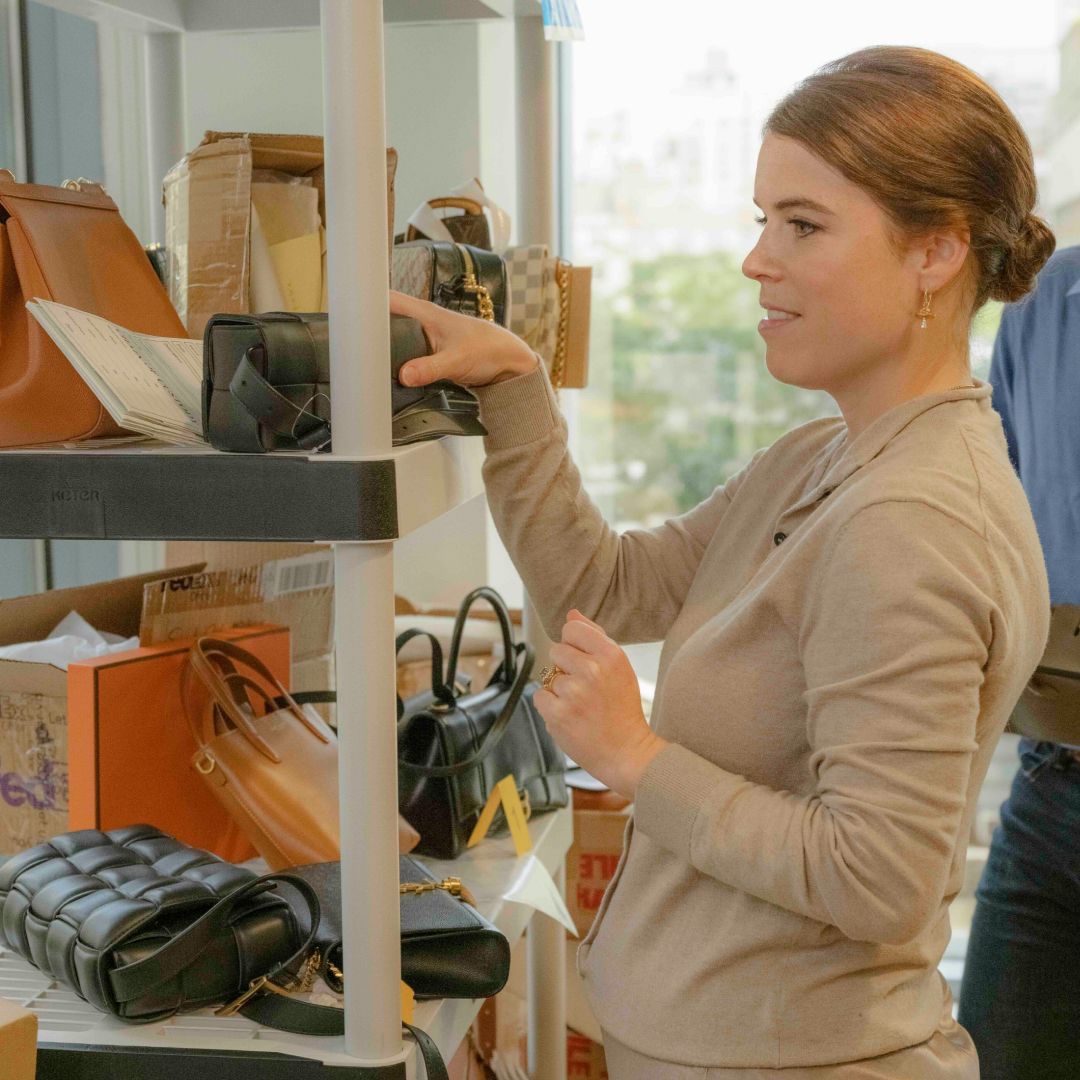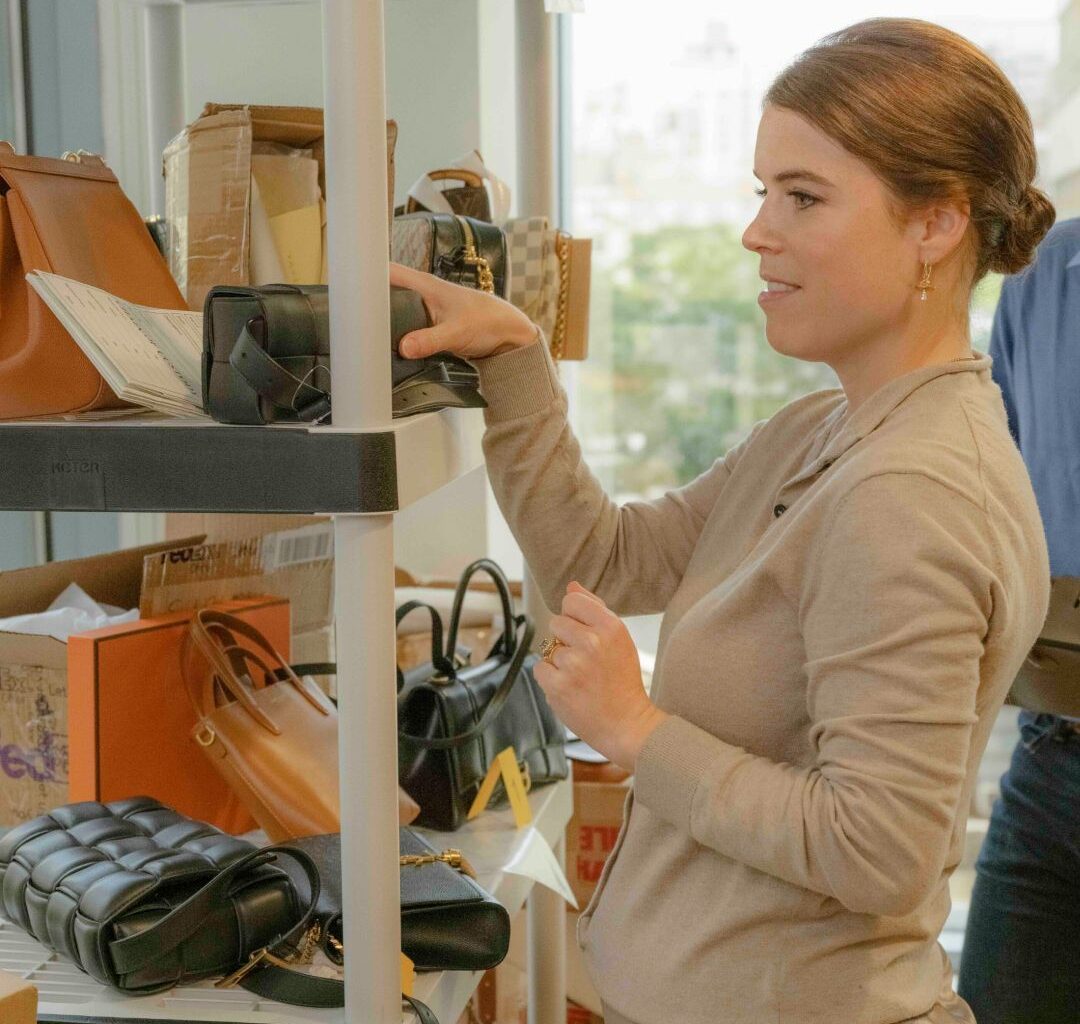 Princess Eugenie wearing a beige sweater looking at a shelf of handbags.
Princess Eugenie wearing a beige sweater looking at a shelf of handbags.
Buying designer replicas has become commonplace over the years—and a huge trend on TikTok—but Princess Eugenie wants consumers to know that these fakes come at a huge cost. On Wednesday, September 24, the princess, who is co-founder of The Anti-Slavery Collective, launched a major new campaign, “Hidden Threads: Fake Fashion – A Human Rights Scandal.” The organization hosted an event with the Transnational Alliance to Combat Illicit Trade (TRACIT) and Entrupy, a leader in AI-powered verification, in Manhattan, where guests could inspect counterfeit goods for themselves and learn about the shocking reality of the industry.
“Fake fashion fuels modern slavery, and The Anti-Slavery Collective is determined to confront and challenge it,” Eugenie said in a statement shared with Marie Claire. The princess continued that the designer dupe industry employs “28 million people today who are forced to work in dangerous and exploitative industries for little or no pay.”
The TikTok hashtag #dupe has more than 6 billion views, according to The Anti-Slavery Collective, and young people are buying record levels of counterfeit designer goods. “Half of European consumers aged 15-24 now say they see no issue in buying fakes—a trend campaigners warn has devastating consequences,” the organization shared.
 Princess Eugenie inspected seized counterfeit goods linked to forced labor and human trafficking at the launch of “Hidden Threads: Fake Fashion – A Human Rights Scandal.” (Image credit: The Anti-Slavery Collective)
Princess Eugenie inspected seized counterfeit goods linked to forced labor and human trafficking at the launch of “Hidden Threads: Fake Fashion – A Human Rights Scandal.” (Image credit: The Anti-Slavery Collective)
 Princess Eugenie inspected seized counterfeit goods linked to forced labor and human trafficking at the launch of “Hidden Threads: Fake Fashion – A Human Rights Scandal.” (Image credit: The Anti-Slavery Collective)
Princess Eugenie inspected seized counterfeit goods linked to forced labor and human trafficking at the launch of “Hidden Threads: Fake Fashion – A Human Rights Scandal.” (Image credit: The Anti-Slavery Collective)
“It’s not always obvious, but the clothes and accessories we buy can come at a hidden cost to people and the planet,” Eugenie shared. “Behind counterfeit fashion are men, women and children coerced into making, distributing or selling fake goods—often at great personal risk and with little gain.”
She adds that The Anti-Slavery Collective’s new campaign is focused on getting consumers to think twice before purchasing replica designer goods. “We want people to pause and think about where their fakes come from and how they were made,” she said.
Princess Eugenie founded the organization in 2017 along with her friend Julia de Boinville after the two met Aloka Mitra, a social activist who supports vulnerable women and children in India, during a 2012 trip to the country. The charity’s new campaign kicks off during the United Nations General Assembly and New York Climate Week as part of a new global partnership between The Anti-Slavery Collective and TRACIT.
“Individual sellers advertising luxury knock-offs on pavements in New York, Paris or Rome, or beach boys selling fake football shirts to tourists are a facade—behind them lies complicated global networks of organized criminals,” said The Anti-Slavery Collective’s CEO, Sarah Woodcock. “By exploring the hidden costs of counterfeit fashion, we hope that this campaign exposes the unfolding story of fake fashion and forced labor, and raises awareness of this underreported human rights scandal.”
